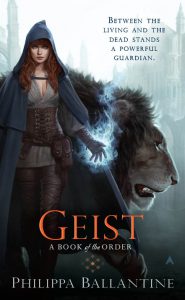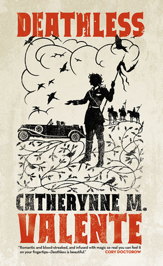This review contains minor-to-moderate spoilers for the previous 19 Anita Blake novels.
#
Toward the end of Smallville‘s eighth season, I told myself, “this is it, it’s getting silly, and I can’t deal with it anymore.” Then General Zod showed up. And I absolutely had to watch. And when it was announced that season 10 would be the last one, I figured, “okay, I might as well stick it out.”
I wasn’t terribly thrilled with the way it all ended, but I was invested in the characters and the story.
And that’s exactly how I feel about the Anita Blake: Vampire Hunter series. When I first started reading it, back in 1996, I thought it was great; it had action, fantasy and horror elements, good characters that I could care about, cool villains, and a fast-paced storytelling style. But sometime around the tenth book, Anita started gaining “power-of-the-week” abilities and having sex with lots… and lots… and lots… of people.
And then the books stopped being about the story and started being about tiny details, nit-picky arguments, and Anita somehow having the perfect power to stop any bad guy. I thought when the Mother of All Darkness was introduced, we’d finally have someone we could respect, who could actually defeat Anita.
I should’ve known better.
 So, Hit List by Laurell K. Hamilton. The reader is thrown into this book running, with Anita and Edward (Anita’s sociopath best friend) in their roles as Federal Marshals, trying to figure out who’s killing weretigers across the country. After some infodump disguised as a police procedural — with some cool stuff about the preternatural branch of the Marshals Service — Anita goes back to the hotel. There the Harlequin show up and severely injure another Marshal, and now we get more info about exactly who is hunting the weretigers and why. (For those who don’t know, the Harlequin are basically the Vampire Council’s Secret Service. Anita defeated them a couple of books ago.)
So, Hit List by Laurell K. Hamilton. The reader is thrown into this book running, with Anita and Edward (Anita’s sociopath best friend) in their roles as Federal Marshals, trying to figure out who’s killing weretigers across the country. After some infodump disguised as a police procedural — with some cool stuff about the preternatural branch of the Marshals Service — Anita goes back to the hotel. There the Harlequin show up and severely injure another Marshal, and now we get more info about exactly who is hunting the weretigers and why. (For those who don’t know, the Harlequin are basically the Vampire Council’s Secret Service. Anita defeated them a couple of books ago.)
But the problem is that Edward and Anita need more than just the two of them, plus a few unproven Marshals that neither one really trusts in a fight. So they bring in crowd favorite Bernardo and serial killer Olaf (and a bunch of were-creatures from St. Louis, Anita’s hometown) to back them up. Before the help arrives, though, Anita tries to confront the local weretigers, to get information, and there she discovers the man who may be the key to stopping the Mother of All Darkness once and for all.
Here’s my major problem with Hit List: it feels like Hamilton wanted to write another book where Anita and Edward take on a lot of really tough bad guys, but she had to advance the overarching story. So there’s a lot of background shoehorned into this novel — which, by the way, is only 320 pages (according to my Kindle). Despite the infodumps and the rather-predictable “let’s stop the pace of the book to have a three-page discussion over some point of conversational/personal protocol”, it moves at a very quick pace. The writing has been tightened a bit after — I’m guessing — reviews of past books have discussed how wordy Hamilton can be. Her action sequences are (except for the discussions) well-written and well-paced, but the rest of the book is a lot of talking, driving around, and going to the hospital. If you’ve read the previous Anita novels, you can compare this one to Obsidian Butterfly.
Which is funny, because that gets referenced too.
Anyway, regardless of my somewhat-backhanded praise above, I had several problems with this book, and while there have been improvements on my general issues with Anita Blake novels (including the last one, Bullet, which I reviewed on my old blog), the problems still exist. Let’s start with the talking. And oh, how there is talking. Everyone talks. A lot. About everything. Even when Anita is about to have sex, she’s still talking. It’s really tough to pace a novel when you have so much talking. At least, I think so.
There was only one sex scene in this book — a record, I think, if you include only the past ten books — and Anita only had one partner in it. Of course he’s never been seen before this book, and of course he’s good-looking, and of course Hamilton spends many sentences describing him, and of course he is exceptionally well-endowed*, and of course they have amazing sex, because I don’t think Anita is capable of having bad sex. I mean, come on — if you’ve had sex, you know that even with someone you love, or even someone you’re really attracted to, it can be bad on occasion. I’m just saying.
Because we were in another city, there weren’t a ton of new preternaturals in this book — and, now that I think on it, very few vampires — but we did get several new humans, including Marshals, doctors, nurses and cops. There’s a few scenes with the Marshals that are creaky and painful, one where a character was (in my opinion) written in specifically to allow Hamilton to write herself out of a corner, and the word Marshal started to look weird after a while anyway. But we definitely knew every character’s eye and hair color, height, build, and what part of him Anita liked the best. Pretty standard fare for the series at this point.
Strangely, there was extremely little contact with our friends back in St. Louis, and that’s what I missed the most. With the exception of exposition and a quick scene near the end, there was no Jean-Claude, no Micah, no Nathaniel, no Jason, and no Asher. I missed them. They’re the reason I read the books — although recently Jean-Claude has been very whiny, and I’m pretty much over him. Also, Anita did slip in a couple of anti-Richard barbs.
Without the Missouri contingent, though, the ending of the book really falls down. I’ve read the same basic story before — in The Laughing Corpse, Hamilton’s second novel, the climax is relatively similar, except that now Anita is more willing to kick ass than to run away (a welcome change). But when the Final Boss shows up, I don’t think it’s a spoiler to tell you that the hero of the book is going to win that fight, and I also don’t think it’s a spoiler to tell you that she does it using what she describes as the “worst” power she holds. Which, of course, works perfectly. Makes me wonder why, if there’s a Vampire Council, they let the vampire who gave Anita that power live for as long as she did (and, of course, it was Anita who killed her to gain said power). There are references in the Boss Fight, though, that directly point to characters that haven’t even been glimpsed in this novel.
Which is one of my problems with it. Hit List is not a novel that a casual reader can just pick up and hope to understand. You really have to have read at least the last three novels to know what’s going on — by then you’ll have at least enough exposition to know why Anita is so powerful.
And believe me, after this (rather disappointing) Boss Fight, not only will she still be powerful but you’ll be wondering what the point is of writing any more Anita books (Hamilton, on Twitter, said she is already working on the next one).
To summarize: I don’t think Hit List is a really good book, especially when held up to others in the Anita Blake series such as Blue Moon, Lunatic Cafe, or my personal favorite, The Killing Dance. While the writing is definitely better and tighter than the past couple of Anita Blake novels, this one doesn’t really stand on its own as a piece of fiction in its own right — it feels more to me like a bridge book, like the author has a story she wants to tell but had to tell this one first to get to that point (the pacing of the Boss Fight is a big clue). I maintain that, in order to bring the series back to what it was during its good days, Hamilton will have to kill off a lot of her characters**. Unfortunately, she’s built the world in such a way that killing one of them would kill (or at least seriously damage) Anita, and we can’t have that.
One thing I will say is that Hamilton loves her characters — even the evil ones — and in Hit List, I see a lot of that, especially with Edward. However, every writer will tell you that one of the first thing s/he learns in seminars and from editors is that you have to cut, and cut, and cut, and when you think there’s nothing to cut, you cut again. And, hey, I love her characters too — they’re the reason I read the books, to keep up with the characters I care about. But the cast list is getting enormous; it’s time to pare it down.
I’m waiting for your next book, Ms Hamilton. Let’s see some cutting.
#
* I wonder what Hamilton’s husband thinks about all of Anita’s lovers — and Anita is definitely a Mary Sue in many regards — being so well-endowed. Of course, since we write what we know…
** Maybe she should call in David Mack. He’s really good at killing off huge swaths of characters in a way that works well in the story and gives them honorable deaths when deserved.





